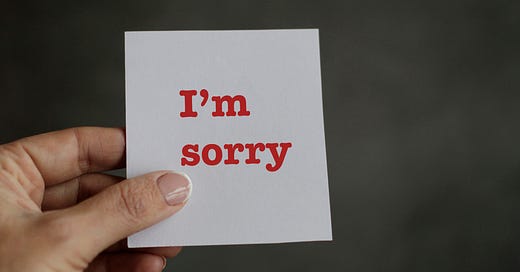Welcome to Raising Good Humans on Bulletin. We are so happy you're joining our judgment-free, science-backed parenting community. Subscribe now to get these articles in your inbox every week, AND consider becoming a premium member for exclusive behind-the-scenes access, LIVE Q&A's, and more original content.
We've all been there. An awkward moment at a birthday party, a playdate gone wrong, an unkind act toward a sibling. What do we do when our kids simply refuse to say they're sorry?
The Question:
“My 3-year-old refuses to apologize whenever he does something mean to his sister. What have I done wrong?”
Start by taking a minute to figure out your goal. Only you know what you’re trying to get out of your child when you want them to apologize. For some of us, it is manners, for others it is genuine contrition, and in other cases it is about empathy.
For me, being able to apologize authentically is the priority. So, that’s the frame I am using in my answer.
It can be tempting to focus on an apology – and it makes sense for adults – but counterintuitively, forcing your child to say they are sorry can make apologies even less effective.
The first problem with forcing an apology is that when our children are upset they cannot access their thinking brain. Without their thinking brain, they cannot learn meaningful lessons. There goes one of the main outcomes we want from their apology.
The second problem is that we may not be modeling apologies to our children. If we often fly off the handle and react poorly, and then don’t do the work of apologizing to our kids, we’ve missed the opportunity to model what a genuine apology looks and feels like.
Here are some steps for teaching your child how to apologize genuinely.
Step 1: “I’m sorry”
This names the feeling.
Step 2: “I’m sorry for…”
This step tells the other person that you understand what you did wrong and that you take accountability.
Step 3: “In the future I will do…” or “Is there something I can do to help you feel better…?”
This step lets the other person know that you are not leaving them to manage the fallout from your wrongdoing.
Step 4: “Do you forgive me?”
This step allows both parties to move on. Keep in mind, though, that you can’t force somebody else to forgive you (and sometimes they won’t). This is a more aspirational step, as it is a big ask for a 3-year-old.
I also want to take a moment to recognize that there are some circumstances where a forced apology seems socially acceptable. In that case, the apology is just about manners, and it may be more effective for you to apologize on your child’s behalf. Let the other adult know that you are working on apologies, and in the meantime you hope that your stand-in apology will suffice. This sends a powerful message to your child, and lets you off the hook under social pressure.
I hope this answer helps, and would love to hear how it goes in your household. Leave a comment and tell me all about it.
Warmly,





